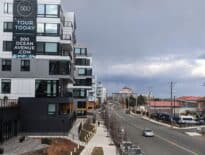
Jacob Oppenheim
The past seven years of the Walsh administration have seen a sea-change in Boston. Housing production has taken off from the abysmal levels seen in the Flynn and Menino years and the skyline of Boston is rapidly changing as infill development patches gaps in neighborhoods.
Previous administrations valued stasis as a counterweight to postwar population flight, attempting to preserve the city of yesteryear. Neighborhoods were frozen in amber, and home prices rose. Walsh oriented the system toward growth, while making no fundamental changes.
As we saw from steadily increasing prices and – until the start of the pandemic – rents, however, this has not been enough. The number of homes built in Boston in recent years is high by the standards of pricier, minimal–growth coastal cities like New York, but it is approximately half the rate of lower-rent cities such as Seattle, whose median rent is three-quarters Boston’s, and Houston, where rents are half those in the Hub.
While the Walsh administration has set vague parameters for the types of projects it will approve, by keeping these rules inchoate and unwritten it has limited both the number of homes built and who can build them. It also continues to empower local gadflies to abuse the review process and block housing. Recent research has shown that these “neighborhood defenders” are wealthier, whiter and unrepresentative of local opinion. The resulting system delivers moderate amounts of housing but cements underlying inequities.
An excellent example of this problem can be found in pricey Charlestown, where redevelopment of roughly 1,000 Boston Housing Authority homes, financed by 1,689 units of new market–rate housing on-site, was under BPDA review for nearly five years before being approved this month, despite clear support from the public housing complex’s residents. Local NIMBYs battled over the number of new units to be built in one of Boston’s most expensive neighborhoods, keeping our neediest citizens in substandard housing by delaying the project. At the same time, our politicians refused to take a public stand encouraging rapid approval and construction.
Current System Is an Obstacle
Mayoral candidate and City Councilor Michelle Wu presents a different vision, elaborated with numerous reform plans. She fundamentally understands a key truth: Our antiquated zoning and system of variances is an obstacle to building for the future. This insight has been missing from the Walsh years; where we have had master planning, it hasn’t been codified into zoning, nearly leading to an Amazon distribution center next to an MBTA Red Line station in one egregious example. Clear, consistent rules are necessary for open and fair governance, where you don’t have to be wealthy or well–connected to build or find affordable homes.
The need for reform has focused so far on the Boston Planning & Development Agency and the city Zoning Board of Appeal. While the rules governing these institutions need to be reformed, their current structure, focused on planning and development, insulated from direct public pressure has been essential to enabling nearly all of Boston’s housing growth.” The BPDA has been critical to approving tens of thousands of affordable homes and workforce housing across the city. The development boom has also fed massive amounts of money into Boston’s affordable housing budget, funding permanently stabilized rents in existing buildings and building thousands of new affordable units.
Building dense housing near transit, especially downtown, is one of our strongest climate policies, especially at the municipal level. The alternative to more housing in Boston is car-centric, greenhouse-gas-spewing exurban development, all too frequently out–of–state in places like Arizona and Florida, and higher housing costs for working- and middle-class city residents. A robustly growing population in 2010 became a slightly decreasing one by 2019 thanks to the price of housing and its limited supply – we are in the middle of a biotechnological revolution and the fundamental drivers of the region’s economy have never been stronger.
Time to Think Bigger
This fundamental tension, between outdated institutions that deliver progress on housing, albeit not enough, and the need for fundamental reform necessary for a more equitable future, will underlie this year’s mayoral race.
Boston’s next mayor needs to think bigger and seek ways to bend our archaic processes towards a long–term vision: codifying master plans, incentivizing affordable development through density bonuses and clarifying the Walsh administration’s guidance for dense development in places that have seen much of it already. A proposal from councilors Kenzie Bok and Matt O’Malley to expedite affordable housing approvals offers an example of these imperatives in action: In large parts of the city, it is still nearly profitable to build affordable and workforce housing without a subsidy.
The next mayor should be asked how they will triple permitting and building again as Walsh did when taking over from former Mayor Tom Menino; how they will enable developers to build at all price points; and how they will tie development to transit, bikes and walking, and to our climate future.
Why should one of America’s most successful and wealthiest cities not be its fastest-growing? Building more housing is critical to ensuring that all can benefit, that the proceeds of progress don’t end up exclusively in the pockets of landlords and that we can build the diverse and innovative city of the future.
Jacob Oppenheim is a board member for Abundant Housing MA.





